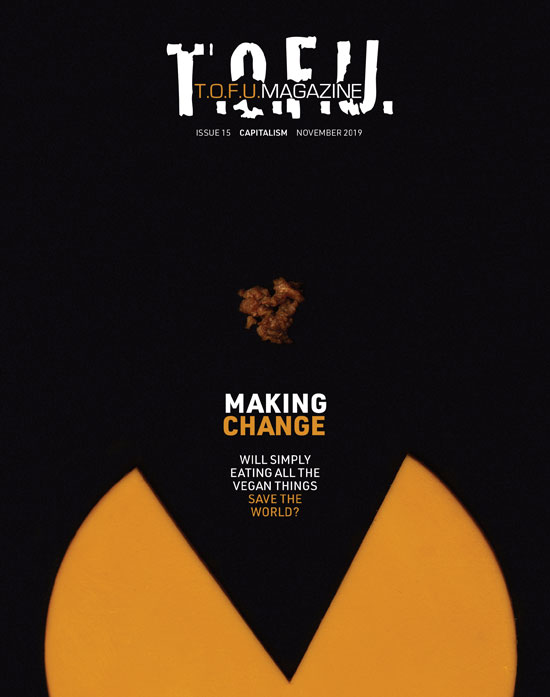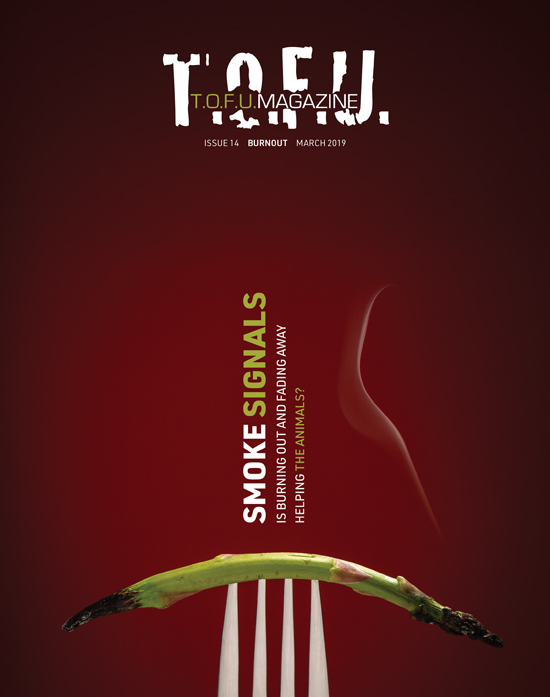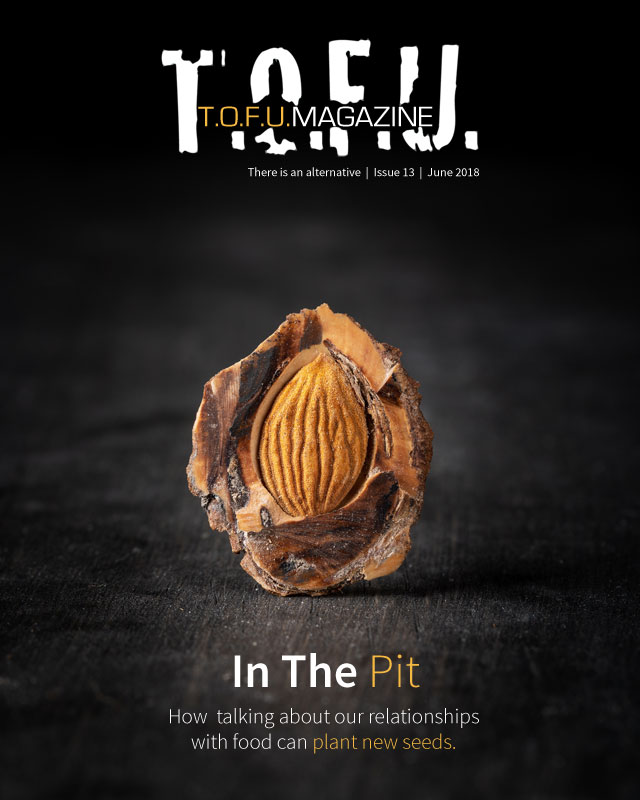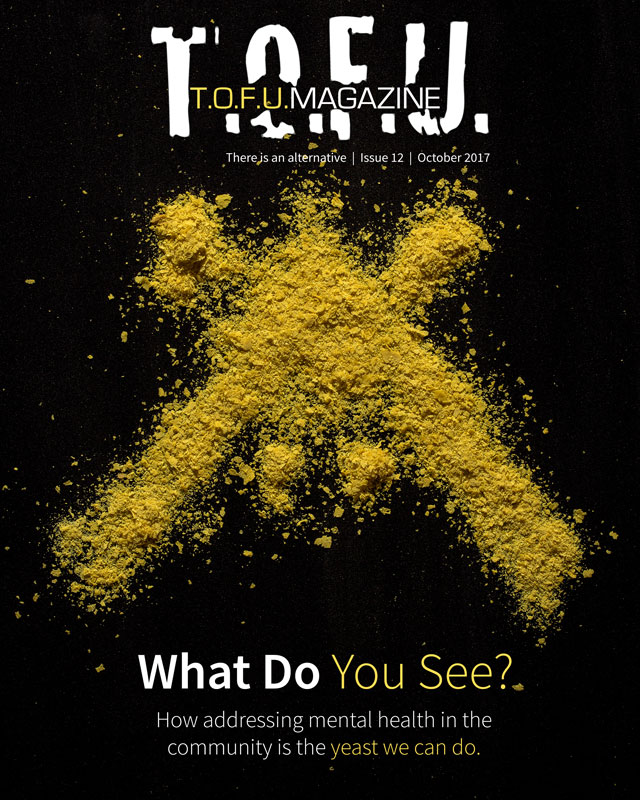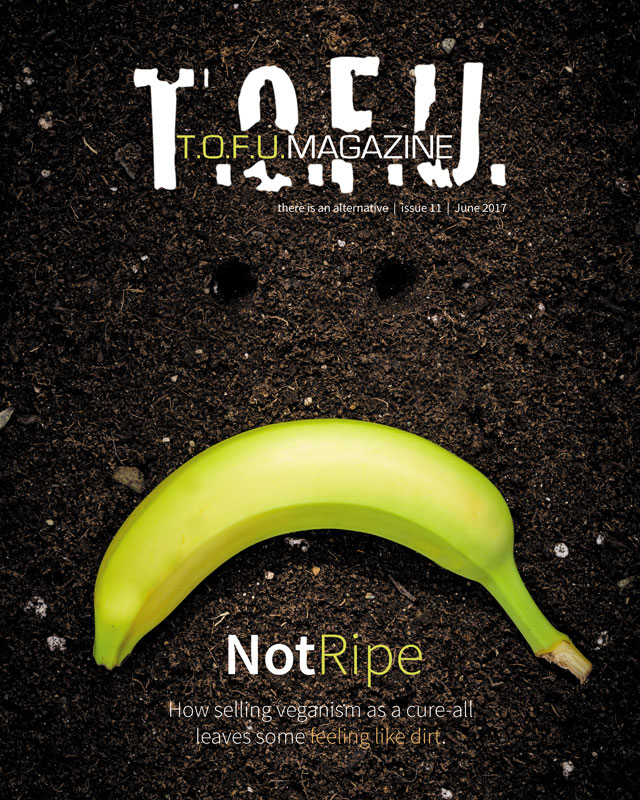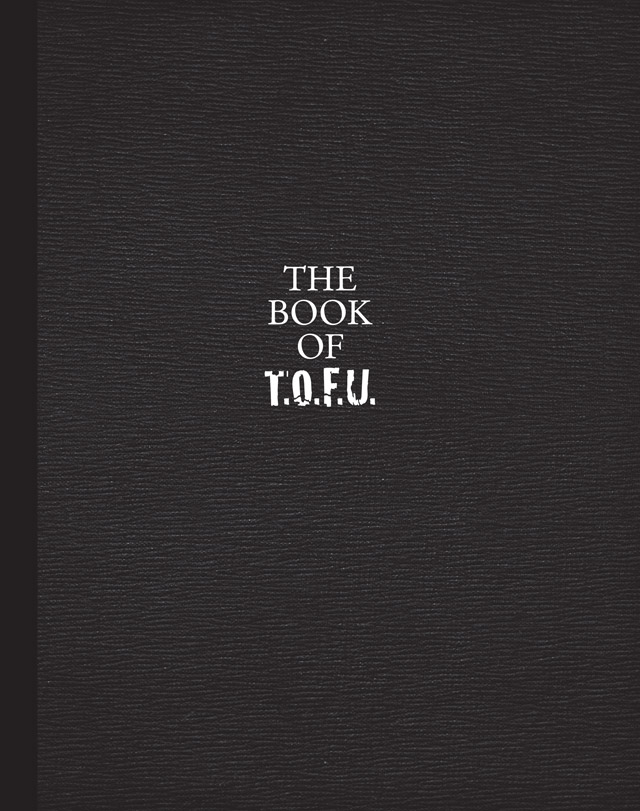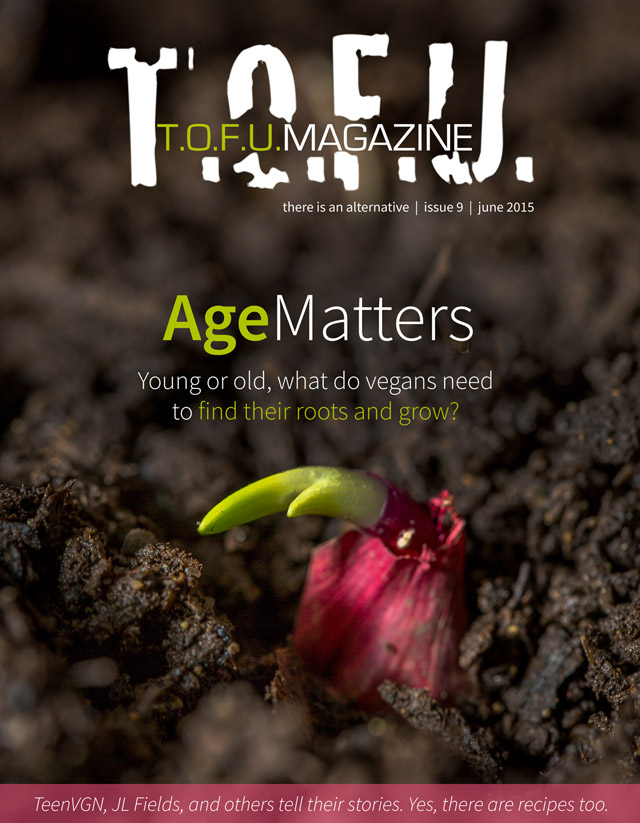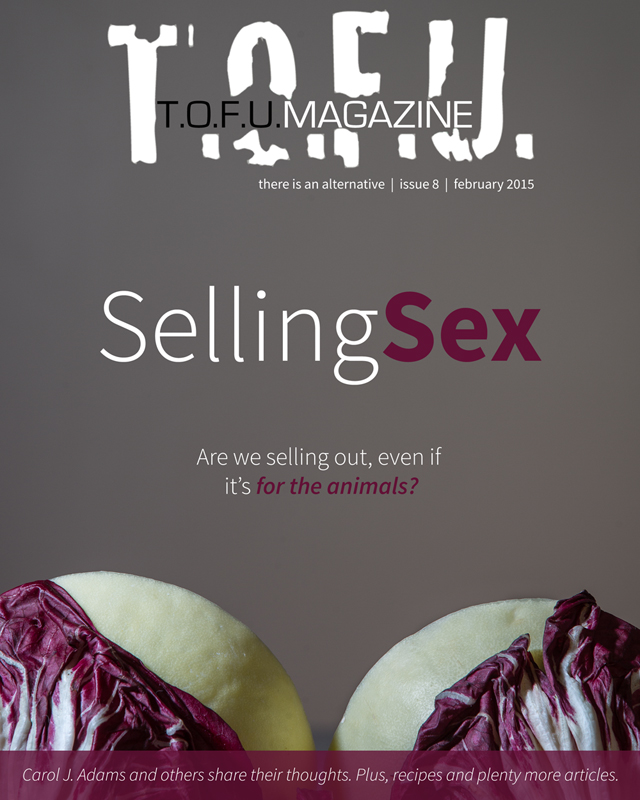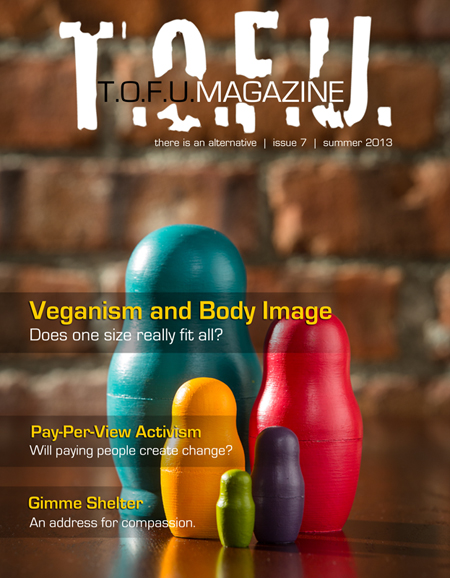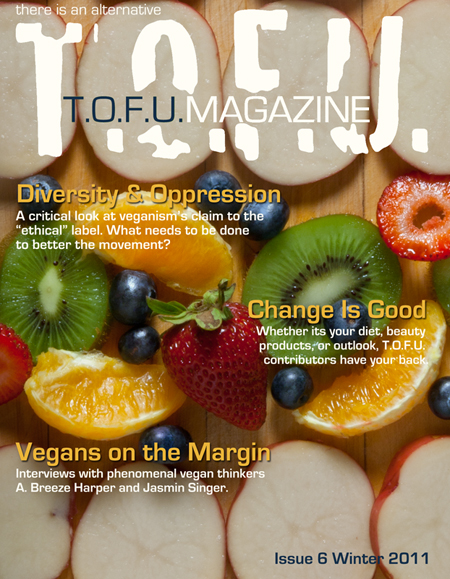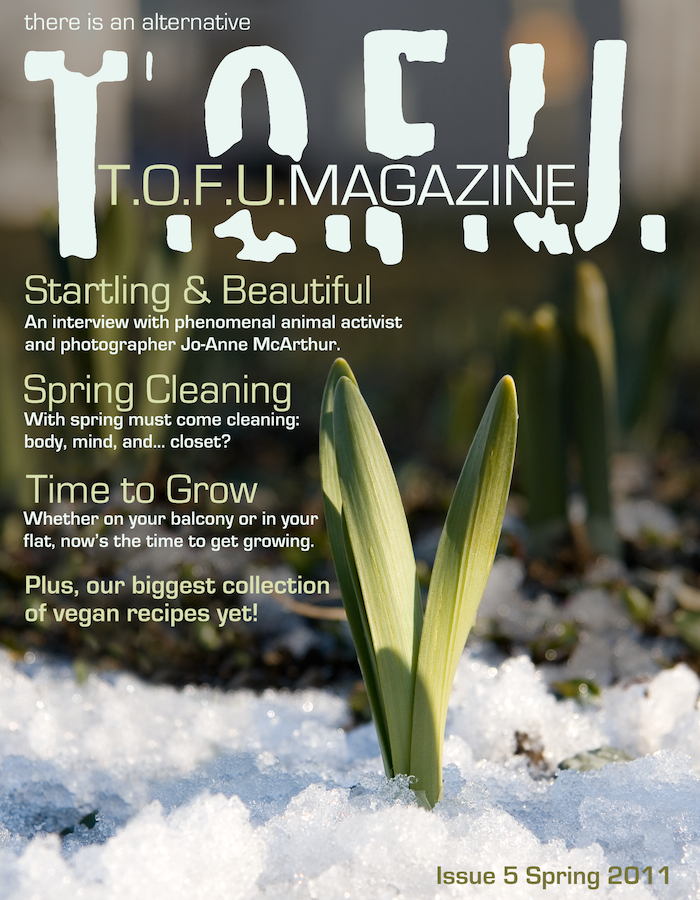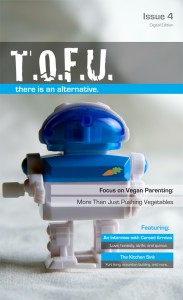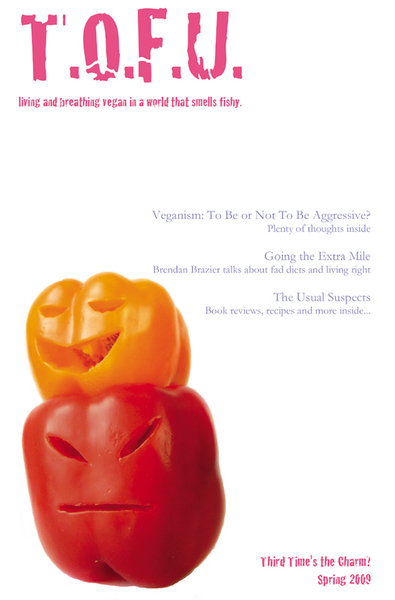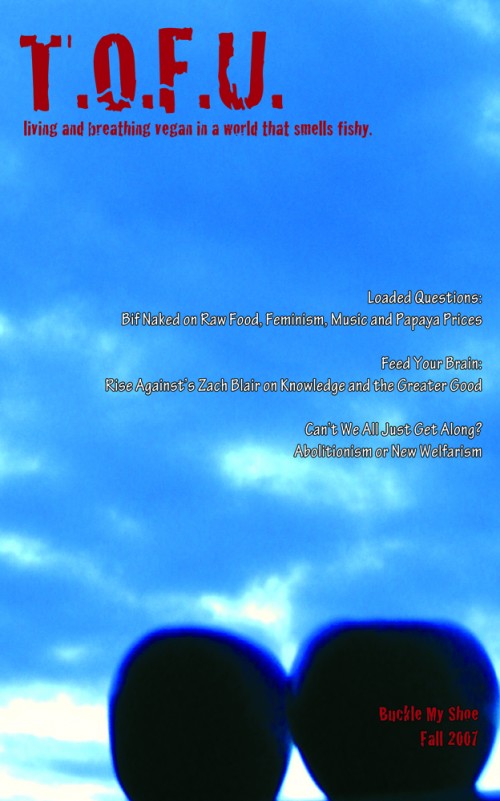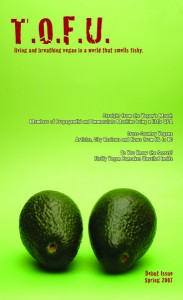T.O.F.U. #12 | Taking What I Need
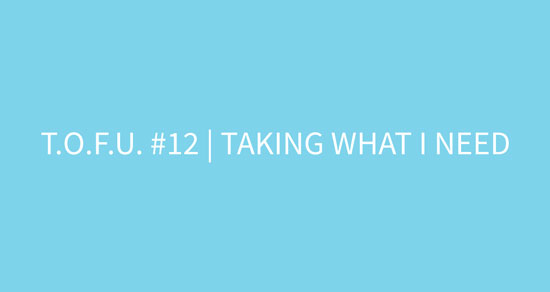
As September 10th is World Suicide Prevention Day, and the next issue focuses on mental health and veganism, I thought it might be appropriate to share one of the pieces that will be included in the upcoming release. I’m incredibly grateful to all the authors who chose to share their personal stories, and I hope their doing so leads to more conversations amongst friends, family members, colleagues, and everyone else about the struggles so many people face. More importantly, I hope it means that less people have to face these issues alone, both within the vegan/animal rights community and outside of it.
Taking What I Need
Words by S.M. Rice
I consciously live a life where I try not to take more than I need. My desire to reduce the space I use and resources I consume are important factors that reinforce my veganism. I know my purpose and I work to fulfill it. I am here to do all I can to reduce suffering in the world, but I cannot commit myself to anything if I do not take care of myself.
Depression was such a constant in my childhood and early adult life, that I did not even know I was experiencing it. At the time, I was so profoundly unhappy that my mental health merely seemed to match my circumstances. The joys of falling in love, getting married, and becoming a mother allowed my issues to catch up with me. My happiness amplified my anxiety and forced me to confront my mental health. When I met my husband, life suddenly felt like the beautiful beginning of summer I was unknowingly anticipating. The warmth and happiness I experienced were overwhelming, but I still felt cold – I couldn’t shake the winter. Privately, I spent so much time feeling angry with myself for allowing fear and sadness to rule when I was genuinely happy. I was confused as to how my heart could betray my head. What I didn’t realize at the time was that positive experiences could spark depression as much as the negative. My life was so much more wonderful than I imagined possible, but I still had days and weeks in which I was incapacitated by feelings of sadness, grief, and aching. How could I be so fulfilled and so full of pain? I blamed myself and believed I was sabotaging my happiness (that is what friends and society told me). It took me nearly a decade living a life that I loved to realize that I was not simply choosing to be anxious and depressed. Though I had finally acknowledged that my mental illnesses were not my fault, I was slow to hold myself accountable and take meaningful action to change my condition.
Plotting a Course
Last year, I spent much of my energy trying to stay afloat. I believed that the difficult situations I faced were actually constructive and brought me to a better place. I left a job with a vegan, social justice organization that I was passionate about and deeply fulfilled by to take my child out of a school where they were struggling. It came with so much fear and self-doubt, but I was also excited and hopeful. I had always wanted to be the person who taught my child to read and found myself increasingly tired of fighting against the colonialist framework of the education system. So, when the opportunity arose, I was grateful for the privilege and chance to participate and be the architect of their education with the ability to incorporate lessons on equality and social justice.
Soon after leaving public school, my child began to explore gender identity and changed their gender expression, which are not the same and also have nothing to do with sexual orientation1. We tried out new names and pronouns and worked hard to break out of the binary boxes society forces us into. I dove into researching how to be the most affirming mom possible. I became active in support groups for caregivers who might find parenting a transgender child difficult or confusing. We found so much love, acceptance, and empowerment in the trans2 community.
Taking the High and Low Roads
As my life stabilized, I learned that my mother had an affair for years during my parents’ marriage, including around the time I was conceived. Most of my family knew for my entire life. They held onto doubts about my paternity and let it shape my identity before I was even born. My father’s family allowed my mother’s actions to poison my childhood, I was called a liar and always unwelcome. When my grandfather passed away, I was left out of family photos as people opposed my inheritance, the $50 savings bond he purchased in my name when I was born. When I confronted my father, it actually healed our relationship. Casting him in a new light made me feel like he truly loved me for who I was. My black sheep status suddenly made sense. So much pain and anger melted away when I understood that I was not to blame. I came into this world out of betrayal and I was not responsible for the climate I was raised in. I may never wholly forgive those who kept my secret from me, but I appreciate their intentions. They thought they knew what was best and wanted to protect me. Now, their decisions no longer weigh on me.
With each challenge, I came to see myself as brave, fierce and liberated. My self-confidence was the highest I had ever known. Every proverbial bone that was broken, healed stronger, but the internal dichotomy rarely faded.
Most days I woke up with a beautiful life and suffocating despair. With every week that passed, I spent more time debilitated and in hiding. I was losing control, as well as my ability to push through the pain. I could feel myself inching towards a cliff that I would not be able to step back from. My therapist believed that, with her help, I could get better. Sadly, my mental health situation was grimmer than even she realized. I worried that sharing my whole truth with her could result in an involuntary hospitalization, her doubting my competency as a mother and, ultimately, full disclosure would result in a complete lack of privacy. I knew I still had control, but would she be convinced of that? I couldn’t risk it. I had to refocus and find ways to cope, on my own.
The End Goal
My greatest tool to combat my depression was to concentrate on activism and volunteering as much as possible. If I could reduce the suffering of others… if I could make someone’s day better… if I could make the world a cleaner, brighter, safer place for a human or non-human animal- it was worth the weight of living. I might deserve to have physical, mental, and spiritual needs of my own. I could still laugh and love, so I was also capable of managing the fears, doubts, and sorrow that took hold too.
I quickly learned that when others (especially activists) insisted that I needed to do “self care,†they were not actually concerned for my well-being. They did not want me to get burnt out, “The animals need you,†they said. Maybe if I had a hobby, I would be happy. Maybe if I lost weight, I would be happy. I should go for nature walks, get a massage, join a book club, or eat more fucking quinoa. Every suggestion actually hurt more than it helped. I tried to convince myself that they were coming from a place of concern, even when it was obvious that they were just trying to end an uncomfortable conversation. Honestly, I couldn’t blame them, I wanted it to end too. So I forced a half-smile and thanked them for their advice. All the while, I was screaming inside, “I AM SUICIDAL! THIS CONVERSATION IS ONLY MAKING ME WANT TO JUMP OFF THE NEAREST BRIDGE!†Only now, can I recognize how their lack of sincerity actually helped me. Had anyone picked up on my vulnerability, the lose thread holding me together would have been pulled free.
As 2016 came to an end, I floated through in a daze. Holiday obligations and distractions stalled the breakdown that was inevitable. I withdrew and avoided as many situations that would force me to feign joy as possible. I was incapable of letting even my closest my friends in and avoided my usual openness, though my honesty was my most cherished trait. After nearly a year of the worst depression of my life, only my husband and sister knew that I was slipping away. It broke my heart to see them powerless and afraid, but my guilt morphed into a prison that stripped away my humanity. I stopped feeling sorry for their pain and started looking for an escape for all of us. I owned my feelings and I was able to remind myself that everything was temporary
Until it wasn’t anymore.
One afternoon, on a chilly January day, I forced myself out of the house and took my child to an indoor trampoline park. From my bench, I smiled every time we made eye contact. At the same time, I was on my phone searching for the closest mental hospital to admit myself to; trying to decide whether to go straight there or by my husband’s office to drop off our kid first. I knew that I needed immediate help. I closed the Internet window and called my doctor’s office. I told them that I wanted to discuss my anxiety and depression, and took their first available appointment. Having hope that we would find a solution allowed me to go on for one more day.
I walked into my doctor’s office, holding my child’s hand. I had explained to them, in 8-year-old appropriate terms, that my brain was sick. As I filled out the appointment questionnaire, I realized how dire my situation was. Everything indicated that I was experiencing severe depression and anxiety. I spoke openly and honestly with the doctor and answered my child’s questions. I walked out of the office with a prescription, and more optimism than I had felt in six months.
One Step Forward
Within a week of taking that little pill, I was feeling like who I was supposed to be (with only minor side effects). When a friend asked me how I was, I was finally able to tell her, “Better.†I openly talked about my prescription with optimism, and then she told me that I should be careful whom I tell. She erased the relief in my voice. I was stunned to realize that someone would question my choice as not being vegan when I clearly needed the medication. I made sure I chose a medicine that did not contain any animal byproducts. However, I couldn’t choose one that didn’t involve animal testing. Not taking the pill was not an option either, and I refused to feel guilty for taking care of my needs.
I will take my pill as long as I need it. I will decrease or increase the dosage, based on my needs. I will not allow anyone else’s judgment to affect my personal ethics, especially when it affects my very survival. We all have to make the choices that are best for us physically, mentally, and spiritually. The ableism that allows someone to question another person’s medical treatment should not be tolerated in the vegan community. I regret that I did not voice my opposition to that attitude or encourage my friend to see how harmful that was. Individually and as a group, we need to fight for those most vulnerable and lend our voice where and how it is needed. With that in mind, I encourage anyone facing anxiety and/or depression to seek out someone who you can trust. You deserve to be seen and affirmed.
References
1. Gender Spectrum. Understanding Gender. Retrieved 4 August 2017 from www.genderspectrum.org/quick-links/understanding-gender
2. Trans* is used here in an effort to include all transgender, non-binary, and gender nonconforming identities.
This article, along with numerous others focusing on veganism and mental health, will be included in the upcoming twelfth issue of T.O.F.U. Magazine. If you’re interested, please consider subscribing through Patreon to help bring it, and all future issues, to print.
Sarah is a body positive, intersectional vegan, the proud mother of a gender expansive child, and wife to a dedicated coastguardsman. She is a long time human rights activist and volunteer with multiple organizations; tabling, marching, fostering, and more. Sarah has dedicated herself to advocating for the rights of our society’s most vulnerable, both human and non-human.

